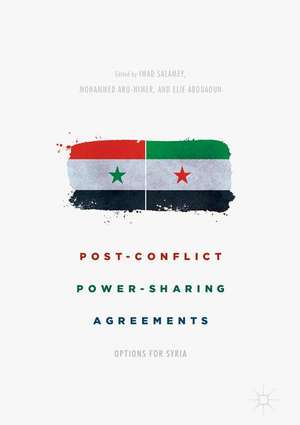Post-Conflict Power-Sharing Agreements: Options for Syria
Editat de Imad Salamey, Mohammed Abu-Nimer, Elie Abouaounen Limba Engleză Hardback – 7 aug 2017
| Toate formatele și edițiile | Preț | Express |
|---|---|---|
| Paperback (1) | 634.49 lei 6-8 săpt. | |
| Springer International Publishing – 12 mai 2018 | 634.49 lei 6-8 săpt. | |
| Hardback (1) | 639.73 lei 6-8 săpt. | |
| Springer International Publishing – 7 aug 2017 | 639.73 lei 6-8 săpt. |
Preț: 639.73 lei
Preț vechi: 752.63 lei
-15% Nou
Puncte Express: 960
Preț estimativ în valută:
122.43€ • 132.94$ • 102.84£
122.43€ • 132.94$ • 102.84£
Carte tipărită la comandă
Livrare economică 23 aprilie-07 mai
Preluare comenzi: 021 569.72.76
Specificații
ISBN-13: 9783319601038
ISBN-10: 3319601032
Pagini: 216
Ilustrații: XIII, 191 p.
Dimensiuni: 148 x 210 x 17 mm
Greutate: 0.4 kg
Ediția:1st ed. 2018
Editura: Springer International Publishing
Colecția Palgrave Macmillan
Locul publicării:Cham, Switzerland
ISBN-10: 3319601032
Pagini: 216
Ilustrații: XIII, 191 p.
Dimensiuni: 148 x 210 x 17 mm
Greutate: 0.4 kg
Ediția:1st ed. 2018
Editura: Springer International Publishing
Colecția Palgrave Macmillan
Locul publicării:Cham, Switzerland
Cuprins
1. Introduction: Comparative Post-Conflict Power Sharing Models for Syria .- 2. Resolving Identity Conflict in the Middle East: A Theoretical Understanding .- 3. Bridging Elite and Grassroots Initiatives: The Road to Sustainable Peace in Syria .- 4. Peace-Building in Syria Through Power-Sharing: A Study of Possibilities .- 5. Women Leading Reconciliation: A Paradigm Shift in Conflict Resolutions .- 6. Pathways to Reconciliation in Divided Societies: Islamist Groups in Lebanon and Mali .- 7. Could the Partition be the Way to End the Syrian War?.- 8. Ways forward in Syria.
Notă biografică
Imad Salamey is Associate Professor of Political Science and the Director of the Institute for Social Justice and Conflict Resolution at the Lebanese American University.
Mohammed Abu-Nimer is Senior Advisor to KAICIID and Professor in the School of International Service at American University, USA.
Elie Abouaoun is Director of Middle East and North Africa Programs at the US Institute of Peace.
Textul de pe ultima copertă
The book surveys comparative power sharing models implemented in societies that have faced identity-conflicts, with attention given to post-conflict design. It analyzes the success and pitfalls of international experiences before proposing a model for Syria. Contributors address the central question: which among the set of power-sharing agreements that have helped settle protracted identity-driven armed conflict can provide Syria with a platform for dialogue, negotiation, and conflict mitigation? The comparative analysis advanced in this book extracts lessons from countries such as Bosnia-Herzegovina, India, Iraq, Lebanon, Mali, Northern Ireland, the Philippines and Sudan. The prospect of a post-conflict distribution of power in Syria is then unraveled from different sectarian, ethnic and regional perspectives. The authors also address challenges of peacebuilding such as violent extremism, gender participation, resettlements, retributions, transitional justice, integration of armed groups and regional and international sponsorship.
Caracteristici
Serves as a guide for policy leaders and diplomats examining innovative approaches to conflict resolution in Syria Bridges research with practical policy orientation by focusing on the paths toward conflict mitigation through the potential reconstruction of power-sharing in Syria Brings together a multiplicity of contemporary and comparative views on Syria derived from different international perspectives
